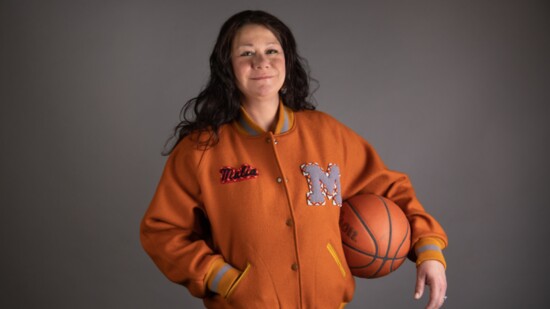The word that best describes Barbara “Malia” Kipp is “trailblazer.” Malia was the first Native American woman to play basketball for University of Montana, and later built a career as a tribal health nurse specializing in geriatrics while raising four children. She has determined her own path and paved the way for those following in her footsteps.
“I came to Missoula and people I would see on the street would look at me sideways, like what are you doing here?” Malia said, reflecting on her 1992 arrival on campus from the Blackfeet reservation in Browning. “It wasn’t until maybe my junior year where I felt that I was proving people wrong in the right way.”
By her senior night, with a string of Big Sky championships to her name, it was harder to mistake Kipp for someone who didn’t belong. During warm-ups, she wore an eagle feather in her hair—representing having gone to battle and overcome—given to her by Chief Earl Old Person. Then the Rawhide Singers appeared on the court and sang the Flag Song to honor her as a warrior.
The moment was captured on film and featured in a documentary called Native Ball: Legacy of a Trailblazer, which aired on PBS last November.
“We worked hard to bring that to life in the right way, building that moment so you could feel like you were part of it,” said Megan Harrington, a teammate of Malia’s who produced, co-directed, and co-wrote the film.
“How [Megan] told my story, I’m super proud of it,” Malia said. “It was a struggle to tell my story. It was emotional for me.”
“I gained a much bigger understanding of how that must have been for her,” Megan said. “The weight that she carried, the way that she carried it, raised my level of admiration for her. What she was able to accomplish and, because of that, the opportunities that others had.”
Fresh from inspiring those younger than her, Malia went to nursing school, and after graduation took a job in Polson at a long-term care facility working with elderly folks.
“My favorite people,” she said. “So appreciative for kindness and just having someone there to listen to their stories. There’s a little lesson in every story. Be thankful for your elders, because if they weren’t here, you wouldn’t be here.”
While working in Polson, Malia discovered a passion for providing comfort to the dying.
“A good death experience is important, not only for the patient but also for the family,” she said. “To know that they went comfortably, that they were in good hands, they didn’t suffer.”
Quality in-home hospice care is often unavailable in Malia’s community, so she has occasionally assisted a dying family member herself.
“Everyone was there, at home, helping out one way or another, and I’d just jump in bed and lay with her,” Malia recalled. “She would ask me what’s going on, and I’d tell her, you’re getting ready to go to heaven. She was happy, because she heard everyone around laughing and eating.”
Malia also worked as an educator at Kicking Horse Job Corps for over a decade, and her teacher side comes out when she speaks to groups of kids about Native Ball.
“Do what you enjoy and keeps you in school,” she likes to say. “Basketball kept me in school, opened doors for me, allowed me to see what my potential was on the floor and in the classroom.”
Malia emphasizes, though, that it’s not always about sports, or higher education as the ultimate goal.
“College isn’t necessarily for everyone, so I wish school would promote what kiddos want to do and help them explore the different paths they can take,” she said. “My dad went to a trade school in Helena and he’s a building inspector. He built our beautiful, three-story house.”
Malia’s dad also helped her develop as a basketball player when she was in high school, and family support started even earlier, on the reservation where almost everybody played basketball.
“Out of all my cousins, I was the only girl there for a few years. If I wanted to play, I had to play with my boy cousins, and they weren't nice on me,” she said. “But a ball player is a ball player—my dad taught me it didn’t matter if you’re playing against a girl or a boy. And so, being a freshman and playing against seniors, I wasn’t afraid of it. I thought, they have more to lose than you do being the underdog. Then you play with no fear.”
These days, Malia’s basketball career is more about playing HORSE with her dad and shooting around with her kids.
“The older you get, the better you were,” Kipp said. “That’s another saying of my dad’s.”
“Basketball kept me in school, opened doors for me, allowed me to see what my potential was on the floor and in the classroom.” - Malia Kipp
